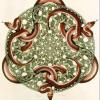[6]-gingerol - fresh ginger
20(S)-protopanaxatriol - ginseng (Panax ginseng)
amentoflavone - Ginkgo biloba, Hypericum perforatum (St. John’s Wort)
alpha-lipoic acid
anandamide - cocoa, endogenous anandamide elevated by acetaminophen
anethole - anise, fennel, liquorice, star anise
apigenin - parsley, celery and chamomile tea
astragaloside IV - Astragalus propinquus (huáng qí)
betulinic acid - rosemary
black raspberry extracts
black rice extract
blue honey suckle extract
capsaicin - chili peppers
cardamomin & cardamonin - cardamon
carnosol - rosemary, sage
curcumin - tumeric
dehydroascorbic acid - oxidized vitamin C
docosahexaenoic acid (DHA) - fish oil, algal oil
emodin - rhubarb, buckthorn and Japanese knotweed
epigallocatechin-3-gallate - green tea
equol - intestinal metabolite of daidzein from soy
gallic acid - chestnut, blackberry, cocoa, walnut, amla, red wine
gamma-tocotrienol - form of Vitamin E especially in annatto, rice, and palm oils
genipin - gardenia fruit extract
genistein - soy isoflavone, also in fava beans
glabridin - licorice
kahweol - coffee
PGG - yeast
phenethyl isothiocyanate - cruciferous vegetables
phytic acid - sesame seeds, pinto beans, flax seed, brazilnuts, soy, almonds, walnut, peanut, oats, brown rice, corn, hazelnut, chickpeas
piperine - black pepper
quercetin - red and yellow onions, tea, wine, apples, cranberries, buckwheat, beans
rosmarinic acid - rosemary, oregano, sage, thyme and peppermint
sesquiterpene lactones - Chinese star anise
silibinin - milk thistle extract
silymarin - milk thistle extract
stinging nettle extracts
sulforaphane - cruciferous vegetables (esp broccoli, cabbage, cauliflower, brussels sprouts)
taurine & niacin
theaflavin - black tea
ursolic acid - apples (especially peels), basil, bilberries, cranberries, elder flower, peppermint, rosemary, lavender, oregano, thyme, hawthorn, and prunes
vitamin D
whithanolides - ashwagandha
acetaminophen
aspirin
atorvastatin
benfotiamine
ibuprofen
nicotine
NSAIDs
zinc


















































